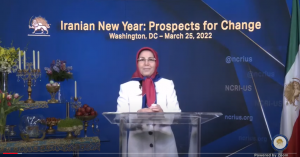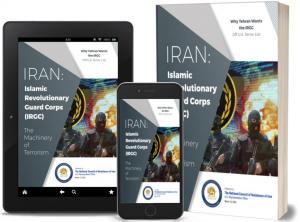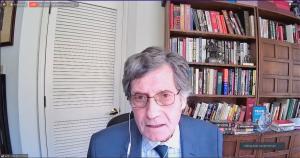
Policy Experts Assess Tehran's Threat, Prospects for Change in Iran
Call To Keep the IRGC on the List of Foreign Terrorist Organizations; No Sanctions Relief. Conference also discussed regime's weaknesses and vulnerabilities.
WASHINGTON DC, DISTRICT OF COLUMBIA, USA, March 28, 2022 /EINPresswire.com/ -- On March 25, 2022, as the ancient Iranian New Year, Nowruz, was celebrated in Iran and around the world, the U.S. Representative Office of the National Council of Resistance of Iran (NCRI-US) held an online conference to examine Iran’s internal situation, prospects for fundamental change, and the Tehran regime’s regional and international behavior. Distinguished policy and national security figures contributed to the discussion of a framework for an effective Iran policy.
Alireza Jafarzadeh, the deputy director of the NCRI’s Washington office, moderated. Outlining the main themes of the conference, Mr. Jafarzadeh said: “We intend to discuss the state of the Iranian regime, its weaknesses and vulnerabilities, the state of protests and the desire of the Iranian people for change. We will also look at what the U.S. policy should be in countering all of these problems, while also helping the people of Iran to achieve freedom, the same way that the people of Ukraine are fighting for their freedom from occupation, invasion and bombings.”
Mr. Jafarzadeh then introduced the speakers, among them senior former American officials, as well as experts from six different think tanks.
Ms. Soona Samsami, U.S. Representative of the National Council of Resistance of Iran, explained how the selection of Ebrahim Raisi was intended to curtail the Iranian people’s struggle for freedom. However, she said, “Raisi has failed. Last year, Iran was the scene of major anti-regime uprisings every four months by farmers, workers, teachers, nurses, defrauded investors, steel workers and fuel porters…This was coupled with the expanding activities of the Resistance Units, a nationwide network of mostly young activists affiliated with the MEK.”
Ms. Samsami added, “Iranian society is like a powder keg, ready to explode at any moment with the slightest spark…Regardless of the outcome of the Vienna talks in 2022, and regardless of the scope and extend of any sanctions relief, the mullahs will never stop their bomb-making program, nor will they abandon their terrorism, or production and launching of ballistic missiles and UAVs in the region.”
Ms. Samsami concluded, “The international community should recognize the Iranian people’s struggle to overthrow the clerical regime and establish a democratic, secular, non-nuclear, Republic of Iran. Nothing can stand in the way of victory by the Iranian people, who have demonstrated incredible courage, resilience and resolve in the face of adversities.”
Hon. Michael Mukasey, 81st Attorney General of the United States spent his speech detailing the Iranian regime’s unrelenting intent to develop a nuclear device. He also argued that removing the IRGC from the Foreign Terrorist Organization (FTO) list would be counterproductive.
“Despite the regime’s claims that it seeks only a peaceful use for nuclear technology, the development of a nuclear weapon has been the goal of Iran’s program from the outset … Iran has been working on that program non-stop since 1979…even during the time when the JCPOA was supposedly in force.”
Judge Mukasey added, “I submit to you that removing the IRGC from the list of foreign terrorist organizations would actually be even worse than not having placed the organization on the list in the first place…That would in effect be the United States saying that the IRGC, which is one of the two entities responsible for Iran’s status as a state sponsor of terrorism, is not itself a terrorist organization.”
Hon. David Shedd, former Acting Director of the Defense Intelligence Agency argued the IRGC’s removal from FTO list would not in any way change the nature of this organization: “And to believe that being soft on them and somehow obtaining an agreement to delist them in exchange for them to behave otherwise is to say the equivalent of having someone change their DNA. Their DNA is terrorism as an instrument of national power, against the Iranian people inside Iran, externally and around the globe.”
The visiting fellow at the Heritage Foundation also analyzed how an IRGC delisting would impact United States interests: “How is it possible to even contemplate another round of an enormous amount of financial support to the Iranian regime that will very quickly go to…the IRGC and the Quds Force?”
Mr. Shedd pointed to the Iranian people’s resistance against a brutal regime: “with the courage and the forthrightness of that opposition that speaks up on a daily basis against this regime in Tehran, we need to stand with the Iranian people.”
Amb. Joseph DeTrani, former Special Adviser to the Director of National Intelligence underlined that the IRGC terrorist designation must remain in effect: “All indications are they will not change what they are doing with their Quds Force, the IRGC, and their proxies.”
On the nuclear issue, Ambassador DeTrani said, “Prior to the JCPOA in 2015, Iran was enriching uranium to the 20% purity level…it would not take that much time to move to 90, 93%, which is weapons-grade enriched uranium… We saw that prior to the JCPOA, we certainly saw it subsequent to the JCPOA.
“I applaud what Senator Menendez has been doing with his colleagues in the Senate with Senate Resolution 511, that reads ‘Establish original fuel bank that would assist international efforts to avoid a destabilizing arms race in the Middle East and would promote the peaceful use of nuclear power.’ This is where we need to be going.”
Amb. Robert G. Joseph, former Undersecretary of State for Arms Control & International Security opened by drawing parallels, “And as we think about Ukraine, another potentially transformative event is taking place, and that is the fight for freedom from the religious dictatorship in Iran.” He criticized the West’s response to the Iranian regime’s “negotiation tactic” as “the very opposite of what the West rightly seeks in support of Ukraine’s heroic struggle.”
Ambassador Joseph criticized the naiveite of accepting the regime’s “empty promises that would never be fulfilled. The IRGC is a terrorist organization…How can this administration believe that rejoining the JCPOA will bring détente with Iran and a more stable region?
“The Iranian regime will never give up its nuclear weapons program. It is a weak regime. It is a desperate regime at war with its people.”
Amb. Paula Dobriansky, former Under Secretary of State for Global Affairs began by examining the state of human and women’s rights in Iran, “Iranians who seek economic rights, fight corruption as we know, and have protested the brutal regime, have been persecuted, they’ve been imprisoned, and sometimes executed as well… Another area that really stands out as egregious in terms of human rights violations is that of women’s rights and dignity.”
The Vice Chair of the Scowcroft Center for Strategy and Security at The Atlantic Council, echoed other speakers in opposing any IRGC removal from the FTO list. She concluded, “The Iranian regime has absolutely supported the revisionist narrative of Vladimir Putin, as well as supporting the Russian invasion of Ukraine, a scorched earth attack on innocent civilians. And in fact, one of Putin’s first phone calls was to the Iranian president after he ordered the invasion.”
General (ret.) Chuck Wald, former Deputy Commander of United States European Command speculated on what might happen if the Iranian regime acquires or develops a nuclear weapon in the context of the ongoing Ukrainian-Russian war: “the threat by Putin that he would use nuclear weapons if forced into that corner, that is a significant issue for any country that has that type of weapon and leverage. My concern is that Iran would move towards the weapon if this agreement is made, that they would have the ability to use any nuclear weapon as total leverage in the Middle East. “
“I totally echo the concerns with the IRGC being taken off the terrorist list. There’s no way that should be allowed to happen. … [and] the ballistic missile development and testing by the Iranians is another step that is lost in the discussion many times but is a significant issue for the United States.”
Amb. Mitchell Reiss, former Director of Policy Planning at the State Department opened with a recount of the recent uprisings by the Iranian people against the regime: “Since 2018, there have been 8 major uprisings in Iran involving 200 cities and hundreds of thousands of people. The protests have continued in 2022. Resistance Units, organized by the main Iranian opposition, the MEK, and consisting of all sectors of the Iranian society, have been leading the protests and targeting symbols of repression all across Iran.”
Ambassador Reiss argued that as the Iranian people resist against this regime, the West and United States have an obligation to prevent Tehran from developing or obtaining nuclear weapons. He went on to reiterate his opposition to removing the IRGC from the FTO list: “First, there is no indication that the IRGC has halted its support for terrorism. In fact, the IRGC took responsibility for a dozen missiles fired into Erbil, Iraq, near the U.S. consulate, just a few days ago. Second, delisting the IRGC would send exactly the wrong message to Tehran and only lead to more terrorism in the region, and perhaps beyond. And third, delisting the IRGC would rehabilitate Iran across the region at exactly the wrong time.”
Ambassador Reiss also drew parallels with the Ukrainian people’s resistance: “The freedom fighters in Ashraf 3, the symbol of Resistance for the Iranian people, have been in the same situation for decades. Whether in Ukraine or Iran, the cause is the same — the fight is for freedom, for democracy, and for equality. In both Ukraine and Iran, these brave men and women are showing the world that these principles are worth fighting and even dying for.
“These principles of freedom, democracy, and equality are enshrined in Madame Rajavi’s platform for Iran, which calls for the universal right to vote, free elections, and a market economy, and advocates gender, religious, and ethnic equality, and a foreign policy based on peaceful coexistence.”
Mr. Jonathan Ruhe, JINSA Director of Foreign Policy began by listing the flaws in the previous JCPOA. “Like in the original deal, the Iranian regime would receive something roughly on the order of a hundred billion dollars in various forms of sanction relief which, as we’ve heard from other panelists, would be an unmerited lifeline of cash for a weak regime. Just as it did when the original deal came out, the regime can be expected to spend most of this money on fomenting instability abroad, especially around the Middle East, as opposed to spending it at home where the money is desperately needed to reverse and address the regime’s incredible mismanagement of Iran’s economy, natural resources, and its human capital.”
Mr. Ruhe added, “compared to the 2015 deal, the regime’s missile and drone capabilities are much more advanced now and it can proliferate these capabilities much more effectively around the Middle East than it could in 2015…when the original deal was agreed, Iran and its proxies used roughly 100 total projectiles in attacks around the Middle East. Most of these projectiles were simple, relatively rudimentary, unguided short-range rockets. By comparison, just last year that number was up to 750.”
Amb. Lincoln Bloomfield, Jr., former U.S. Assistant Secretary of State for Political Military Affairs drew on current events in Ukraine to illustrate a broader issue facing the West vis-à-vis the Iranian regime: “when this is over, I believe the West will have come together to stand against aggression, against criminal violations of the Geneva Conventions, the laws of war. I think Russia will be weakened for some time. I think China will have to think very hard about the lesson of this event. And I think the same thing is true of the mullahs of Iran.”
“Iran continues to violate international norms. The crisis in Ukraine reminds us that international norms are what we must live by in a peaceful world. So, when this is over, mark my words, it’s time to have a major conversation about the return of democratic countries, the freestanding world, and groups like the NCRI, to support Madame Rajavi’s 10-point plan, which is perfectly consistent with all of our values, and to stand for these things not just because it makes us feel good but because we need to push back against the deep danger of authoritarians, from Moscow to Beijing to Tehran and elsewhere.”
Dr. Steven Bucci, visiting fellow at The Heritage Foundation pointed out that the idea that that regime would change its terrorist stripes and suddenly be nice was ludicrous and ignorant then, and it still is today. The money released from the frozen accounts and outright gifted to Iran did nothing but fuel terrorism and the continued development of the other weapon systems that Iran is counting on to bring even more destruction to the region.”
He added, “We must stop this foolishness of trying to work with the mullahs, return to operating from a position of strength and maximum sanctions, and do our best to end this horrific regime and work toward true freedom for the Iranian people.”
Dr. Siamack Shojai, Professor of Business at William Paterson University explained how any sanction relief would go directly into the regime’s pocket: “More than 70% of the Iranian economy is controlled by four major agencies. Three of them are directly under the rule of Khamenei, the Supreme Leader. And the fourth, also under his rule and control, is indirectly controlled by the Revolutionary Guards in support of the terrorist activities of the regime abroad… Every dime, every dollar released through the clergy in Iran to the Revolutionary Guards, is a dollar which goes directly into the hands of terrorists all over the world.”
Professor Shojai debunked the argument that sanctions are the root of the people’s suffering: “the unemployment rate among youth being more than 40%. The unemployment rate among women is literally 90%…the sanctions have had nothing to do with the mismanagement and corruption that exists in Iran, which has caused economic misery among the Iranian people.”
Dr. Behzad Raofi, Chief Validation Engineer for Space Missions, an Iranian-American who spent nearly four decades in the space exploration industry in support of NASA and international space missions said, “Iran’s claim of a peaceful space and nuclear program is merely a front for its activities aimed to develop a nuclear weapons capability.
Former NJ Senator Robert Torricelli began by celebrating resistance against tyranny, from Ukraine to Iran: “The international community, in almost lockstep, is putting sanctions on the Russians ... we ask ourselves, how about Iran? ... No sanction is too tough until the Ukrainian people have their freedom back and their children have a future and they’re safe and secure. That’s the same policy for Iran.
Seena Saiedian, an Iranian-American studying at the University of Berkeley, representing the Iranian youth, played a Persian folk piece on piano called "Gole Goldoon" ( blossoming flowers ) which invokes Spring's sense of hope and rebirth.
###
--------------------------------------------------------------------------
These materials are being distributed by the National Council of Resistance of Iran-U.S. Representative Office. Additional information is on file with the Department of Justice, Washington, D.C.
NCRI-US
National Council of Resistance of Iran - US Rep.Office
+1 202-747-7847
email us here
Visit us on social media:
Facebook
Twitter
LinkedIn
Call To Keep the IRGC on the List of Foreign Terrorist Organizations; No Sanctions Relief. Conference also discussed regime's weaknesses and vulnerabilities.
EIN Presswire does not exercise editorial control over third-party content provided, uploaded, published, or distributed by users of EIN Presswire. We are a distributor, not a publisher, of 3rd party content. Such content may contain the views, opinions, statements, offers, and other material of the respective users, suppliers, participants, or authors.









